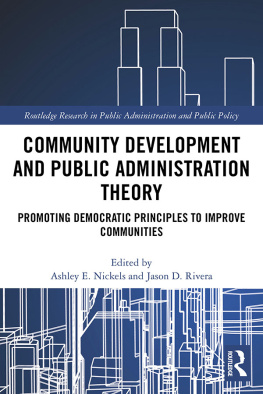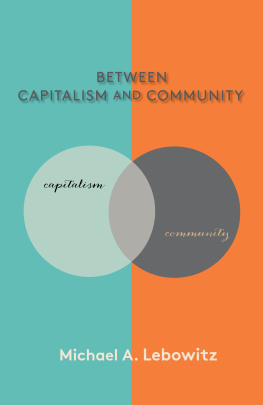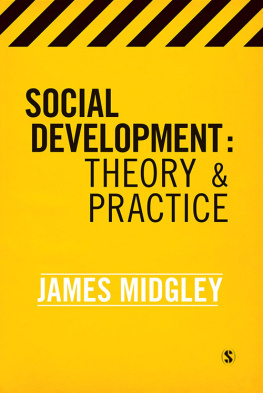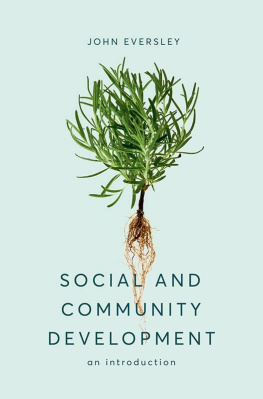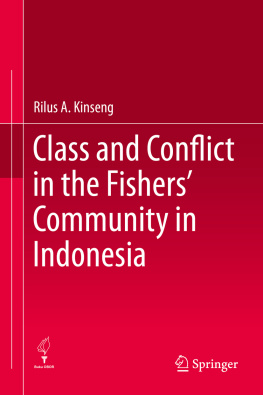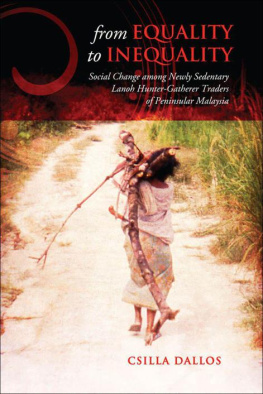CLASS, INEQUALITY AND COMMUNITY DEVELOPMENT
Edited by
Mae Shaw and Marjorie Mayo
First published in Great Britain in 2016 by
Policy Press University of Bristol 1-9 Old Park Hill Bristol BS2 8BB UK Tel +44 (0)117 954 5940 e-mail
North American office: Policy Press c/o The University of Chicago Press 1427 East 60th Street Chicago, IL 60637, USA t: +1 773 702 7700 f: +1 773-702-9756 e:
Policy Press 2016
British Library Cataloguing in Publication Data
A catalogue record for this book is available from the British Library
Library of Congress Cataloging-in-Publication Data
A catalog record for this book has been requested
ISBN 978-1-4473-2245-0 hardback
ISBN 978-1-4473-2246-7 paperback
ISBN 978-1-4473-2249-8 ePub
ISBN 978-1-4473-2250-4 Mobi
The right of Mae Shaw and Marjorie Mayo to be identified as editors of this work has been asserted by them in accordance with the Copyright, Designs and Patents Act 1988.
All rights reserved: no part of this publication may be reproduced, stored in a retrieval system, or transmitted in any form or by any means, electronic, mechanical, photocopying, recording, or otherwise without the prior permission of Policy Press.
The statements and opinions contained within this publication are solely those of the authors and not of the University of Bristol or Policy Press. The University of Bristol and Policy Press disclaim responsibility for any injury to persons or property resulting from any material published in this publication.
Policy Press works to counter discrimination on grounds of gender, race, disability, age and sexuality.
Cover design by Policy Press
Front cover image: Ian Martin
Readers Guide
This book has been optimised for PDA.
Tables may have been presented to accommodate this devices limitations.
Image presentation is limited by this devices limitations.
For all those committed to the pursuit of democratic community engagement, solidarity and social justice, including many of our own former students.
SERIES EDITORS PREFACE
Rethinking Community Development
Communities are a continuing focus of public policy and citizen action worldwide. The purposes and functions of work with communities of place, interest and identity vary between and within contexts and change over time. Nevertheless, community development as both an occupation and as a democratic practice concerned with the demands and aspirations of people in communities has been extraordinarily enduring.
This book series aims to provide a critical re-evaluation of community development in theory and practice, in the light of new challenges posed by the complex interplay of emancipatory, democratic, self-help and managerial imperatives in different parts of the world. Through a series of edited and authored volumes, Rethinking Community Development will draw together international, cross-generational and cross-disciplinary perspectives, using contextual specificity as a lens through which to explore the localised consequences of global processes. Each text in the series will:
promote critical thinking, through examining the contradictory position of community development, including the tensions between policy imperatives and the interests and demands of communities;
include a range of international examples, in order to explore the localised consequences of global processes;
include contributions from established and up-and-coming new voices, from a range of geographical contexts;
offer topical and timely perspectives, drawing on historical and theoretical resources in a generative and enlivening way;
inform and engage a new generation of practitioners, bringing new and established voices together to stimulate diverse and innovative perspectives on community development.
If you have a broad or particular interest in community development that could be expanded into an authored or edited collection for this book series, contact:
Mae Shaw
Rosie R. Meade
Sarah Banks
Acknowledgements
We are very grateful to all the contributors to the book for their commitment to the project and for working in such a timely and cooperative way. We would like to thank Ian Martin who generously offered one of his original paintings for the front cover. We also wish to acknowledge the support and advice of Oga Steve Abah, Tom OConnell, Andrea Cornwall and Gary Craig, who offered very helpful suggestions regarding the development of the book series as a whole. Finally, we would like to thank the staff of Policy Press, particularly Isobel Bainton, and the anonymous referees for their helpful advice and encouragement.
Notes on contributors
Anindita Adhikari is a PhD student in Sociology at Brown University. Her research looks at state capacity and citizenship in contexts of deep democratic contestation. Before this she worked with the Indian government at the state and national levels. She has extensive experience in research and implementation of Indias social protection programmes and is also associated with the peoples movement on the Right to Work. She received her Masters in Development Studies from the Institute of Development Studies, University of Sussex.
Stefania Barca is Senior Researcher at the Center for Social Studies of the University of Coimbra (CES/UC), Portugal. Her research interests span across environmental history and political ecology, with a special focus on industrialisation and deindustrialisation processes, environmental justice and the commons. Her book, Enclosing water: Nature and political economy in a Mediterranean valley (Cambridge, UK: White Horse Press, 2010), was awarded the Turku Prize for best research monograph in environmental history in 2011. She is now working on a global history of working-class environmentalism.
Anna Bilon works at the University of Lower Silesia, Poland. She graduated in pedagogy and philosophy from University of Zielona Gora. Now, she deals with sociocultural animation, career counselling (as a social phenomenon) and neoliberal policies impact on social services analyses. Her research interests also include social and educational policies. Her latest interests are the effects of political transformation on local communities and social services in Poland.
Gary Craig is Emeritus Professor of Social Justice at the Wilberforce Institute for the Study of Slavery and Emancipation, University of Hull, UK, and has been Professor or Visiting Professor at six other universities. His research interests include community development, race and ethnicity, modern slavery and local governance. He is a former editor of the Community Development Journal and has written widely on community development issues. He was a community development worker for 20 years.
Frederico Daia Firmiano is Assistant Professor at Fundao de Ensino Superior de Passos/Universidade do Estado de Minas Gerais (FESP/UEMG) in Brazil, and author of the book A formao cultural dos jovens do MST: A experincia do assentamento Mrio Lago, em Ribeiro Preto (SP) (Cultura Acadmica, 2009). His research focuses on the expansion of agribusiness in Brazil and the forms of resistance employed by landless rural workers.
Mat Danaher works for UNISON, UK, and has been responsible for working with communities.


